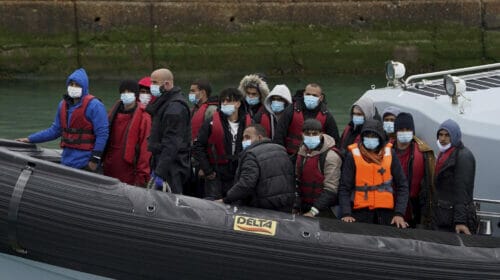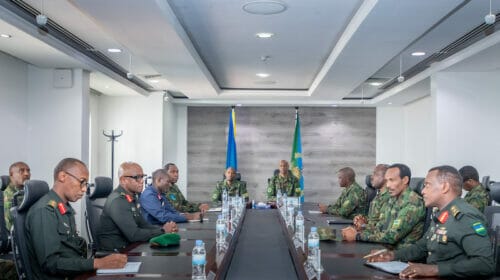Will it ever be safe to speak up in Rwanda?
 By: Jennifer Fierberg, MSW
By: Jennifer Fierberg, MSW
It has been another interesting week in the confusion and danger that is Rwandan politics. Frank Habineza, President of the Democratic Green Party of Rwanda has announced his return to Rwanda to register his party and run for parliament. This move has sparked many online discussions as to his motives, timing and speculations of him being “bought” by the current ruling regime. Mr. Habineza has defended his decision with his desire to be a part of the country he loves and desires to serve. He has stated in many conversations that he wants to serve the people of Rwanda in the best way he knows how.
The most discussed and controversial Rwandan opposition group would be the Rwanda National Congress which is headed by four senior officials from the current President Paul Kagame’s regime who have all fled the country and live in exile from fear of unlawful persecution. All four were sentenced in absentia for alleged crimes committed inside and outside the country. Many speculate that their sentences were decided upon out of bitterness from their former boss. Just last week one of the major outspoken leaders and brother-in-law to General Kayumba Nyamwasa, Frank Ntwali survived an attempt on his life after he was stabbed eight times by men posing as undercover police officers.
If you follow Rwandan politics then you know that Victorie Ingabire Umuhoza continues to languish in a high security prison under charges of “genocide ideology,” a criminal charge that the Rwanda regime uses on anyone who criticizes or challenges the government on any issue. President Kagame has charged many opposition leaders with this vague law and gained his desired outcome of no open democratic space in Rwanda. He ran for office unchallenged by any party in 2010 because no other parties were allowed to register and actually run in an election. Many speculate that had Mrs. Ingabire run for office she would have won the election. Instead she was imprisoned and Paul Kagame won with a staggering 93% of the votes. Although, not only Mrs. Ingabire remains imprisoned but many more political prisoners remain in overcrowded jails in Rwanda without the hope of freedom or democracy.
In the last three months Rwanda has seen tens of millions of dollars being cut from their foreign aid donors who have been backing Paul Kagame since 1994 to the amount of 50% of their national budget. This is a huge deficit to a small country that remains in the process of rebuilding after a devastating war.
But, Paul Kagame’s Rwanda is not the Singapore that the random Rwanda observer may think it has become. In a six page statement made last week by Deo Lukyamuzi, Commissioner for External Relations, FDU-Inkingi he stated that President Kagme has a history of violence inside Rwanda as well as ethnic exclusion in government. In part Mr. Lukyamuzi stated:
“In the past ten years, Rwanda by which they often mean Kigali has been praised, and glorified as a shining example in Africa, a success story in the middle of hopelessness. Rwanda has been nicknamed the African Singapore. President Kagame is a constant feature on American CNN, economic conferences and business round tables, people appear anxious to know how he did it.
To an unconcerned observer, all the above is believable, and this is how non Rwandans have been convinced that Rwanda is an actual miracle, both socially and economically transformed in such a short period. In this information age, it is easy to be misinformed when you rely on the same source of information and not cross check its validity.”
He further states that:
“Referring to an eleven million people country as a success story, with all its diversities and complexities is rather over generalising and lazy. It is reducing a people with centuries of history to a simple project. A success story is case-specific. It is measured by how much progress is made towards achieving the objective.
After the 1994 genocide, the country surely had intractable challenges. These were among others; healing the soul of the nation that was still bleeding from the mortal wounds inflicted by genocide, reconciling the population along the Hutu-Tutsi ethnic divide, reconstituting the state whose institutions had been decimated by the civil war and genocide, rebuilding the economy that had suffered a four year civil war, re-establishing peace and stability, pacify the whole country from security threats caused by the defeated forces either within the country or in neighbouring countries and embark on a democratisation process lack of which had been the root cause of the conflict in the first place.”
In part he discusses what it is like to leave President Kagame’s regime:
“It is unheard of, as a Rwandan politician to disagree with Kagame’s policies and be free after parting ways. Whether they leave at their own free will or they are forced out, all former members or associates of RPF in party or in government, they never live a free life after parting ways. It is like a mafia life –you stay in forever or you die. A few are lucky to flee at night into exile but even this exile better be far away beyond the rich of Kagame’s henchmen. Kagame’s killing machine has gone as far as South Africa, United Kingdom and far flung places like Sweden. “
In regards to his observations on the ongoing violence within Rwanda Mr. Lukyamuzi made the following observation:
“During these last 18years, there were also mass massacres that occurred on several occasions. There are witnesses to these crimes both local and international. There are documented evidence attesting to these crimes, hidden away in UN archives or individual countries like Zambia and Australia whose peacekeeping contingents and UN employees were present when all this happened. There are several other countries whose advanced technologies enable them to capture these events in real time. Under international law, President Kagame and many of his lieutenants would be found guilty of war crimes of the highest category.”
In regards to reports on economic development in Rwanda Mr. Lukyamuzi clearly stated that:
“Similarly, there is too much talk about the Rwanda booming economy. Often, analysts especially self-serving ones, exaggerate phenomena and misuse adjectives. There is nothing booming in Rwanda let alone the economy. 60% of the people cannot afford a single pair of shoes, millions cannot afford more than one meal a day and health services appear more miraculous in fictive statistics than in actual reality. Kagame’s regime is more interested in impressing outsiders than serve Rwandans and as such, their politics is to concentrate energy and resources to Kigali as a gate-way to Rwanda. Having paved roads, high-rise building and floral displays in Kigali does not in any way portray the right picture of the rest of the country. About 70% of Rwandan population still lives in village and subsist on rudimentary agricultural practices.”
Deo Lukyamuzi of the FDU-Inkingi finishes his statement by saying:
“We cannot refer to RPF and Kagame’s performance as a success story. In the view of Rwandans, Kagame failed miserably and if he left power today, there is no semblance of guarantees that the country would not slide back in anarchy similar to post RPF and as they say, a regime’s success is as good as how much it outlasts its architect.”
His full statement can be found on Page three at www.FDU-rwanda.org
While President Kagame continues to hold tight his grip on power in Rwanda reports have surfaced that just over this last weekend another opposition group inside of Rwanda that is continuously harassed by the local RDF (Rwanda Defense Forces). In a press statement the other part of the FDU-Inkingi (yes, there are two groups by the same name with a very complicated recent history of a split in the group) has the following to say about the events of the weekend:
Kigali, 26 August 2012
RWANDA: FDU-Inkingi Secretary General, Sylvain Sibomana, assaulted before detention.
Mr. Sylvain Sibomana, FDU-Inkingi interim Secretary-General, was under police detainment at Remera station (Kigali city) today until 14:30. Visiting opposition colleagues noticed traces of blood spurting out of his mouth after being beaten by police officers. The opposition leader was assaulted when he rushed to inquire the situation of Mr. Shyirambere Dominique, a leader of Parti Social Imberakuri in Gasabo District (Kigali city), who spent the night under siege after he refused to open to armed strangers in the night.”
FDU-Inkingi
Boniface Twagirimana
Interim Vice President.”
This is not the first time Mr. Sibomana has been arrested or beaten for his political activities.
With such a dangerous level of violence toward political opponents one has to wonder what President Paul Kagame is afraid of. His wrath is felt all over the world for anyone who dares to criticize him but now the world is waking up and paying attention in the form of foreign aid cuts or freezing of disbursements based on his continued support of a rebel group inside DR Congo called the M23 which he has vehemently denied any dealings with.
Will the reality of peace ever be felt in Rwanda? With the passing of new legislation that allows the government to spy on any individual, except the President, inside the country how can anyone feel safe? With every communication being closely monitored will there ever be freedom of speech?
The answer is no, not under President Paul Kagame’s death grip on the country.


